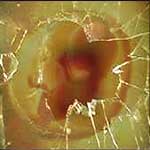 His second week of pregnancy your body is now very busy. Your uterus is preparing for the arrival of their baby. During the second week, their estrogen aunmenta at this time sending a message to your uterus to prepare for a future pregnancy. Your uterus will form a lining which is rich in blood for the egg to implant and start growing the placenta to nourish your baby.
His second week of pregnancy your body is now very busy. Your uterus is preparing for the arrival of their baby. During the second week, their estrogen aunmenta at this time sending a message to your uterus to prepare for a future pregnancy. Your uterus will form a lining which is rich in blood for the egg to implant and start growing the placenta to nourish your baby. Increased levels of progesterone prepare the uterus to support a fertilized egg. While all this happens, the ovaries begin to mature eggs in fluid-filled sacs called follicles. During this time you may notice when you are ovulating, you can feel the stitches in the side of his abdomen. Normally this is an indicator of ovulation, with the tenderness of their breasts. When the eggs are ready for fertilization, they are released from the follicles to begin your day in the fallopian tubes where they can meet the sperm of her dreams.
The sperm must be able to travel up through your reproductive tract, through your cervical mucus in the uterus, and through her fallopian tubes to reach the egg. Sperm must be able to complete the time within forty-eight hours or sperm will no longer be viable. If this does not happen and their eggs are fertilized during this time your uterus will begin to convert the monthly bleeding. As a result you start to menstruate and the cycle begins again.
 "Pink or blue? The sex of your baby is determined at the time of fertilization, which occurs at the end of the week. Of the 46 chromosomes that make up your baby's genetic material, two chromosomes, one sperm and one egg, determine the sex of the baby. Each egg has an X chromosome sperm may have an X chromosome or a Y chromosome If the sperm has a X chromosome, have a child, if the sperm has a Y chromosome, your baby will be male.
"Pink or blue? The sex of your baby is determined at the time of fertilization, which occurs at the end of the week. Of the 46 chromosomes that make up your baby's genetic material, two chromosomes, one sperm and one egg, determine the sex of the baby. Each egg has an X chromosome sperm may have an X chromosome or a Y chromosome If the sperm has a X chromosome, have a child, if the sperm has a Y chromosome, your baby will be male. When it reaches the uterus, this group of cells and reaches 32 and is called a morula. One week after fertilization, there are 250 cells.
0 comments:
Post a Comment